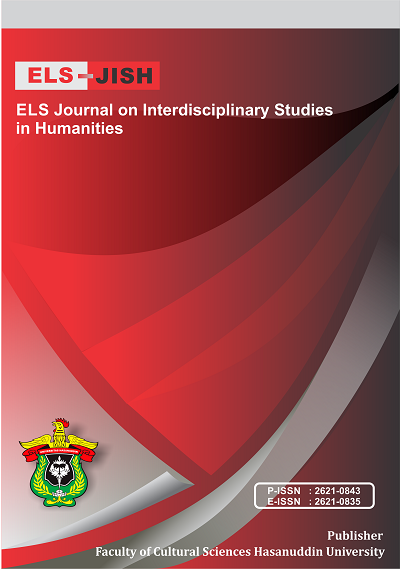Utilizing Mobile App: (Hello English) Has Significant Impact on Students’ Vocabulary Mastery
DOI:
https://doi.org/10.34050/elsjish.v6i1.26157Keywords:
Hello English App, MALL, Vocabulary MasteryAbstract
The purpose of this research is to find out the relationship and significance impact of utilizing Mobile Assistance Language Learning (MALL) through Hello English Application as learning media on student’s vocabulary mastery. The quantitative method was used by researcher because the data will be processed in numerical form and statistical analysis. In this research is conducted without a control group, so the data analysis used pre experimental research design one group pretest- posttest. The sample of the research was consisted of 25 students at seventh grade of MTS Salafiyah Pajarakan in academic Year 2022/2023. The data was collected by using test which consisted of pre-test and post-test. The Wilcoxon signed-rank test resulted z-score of -4.298 with a p-value (Asymp.Sig. (2-tailed). The significance value is 0.000 less than 0.05, so the hypothesis decision is to accept Ha and reject Ho. It means that there is a significant difference between the pre-test and the post-test. It can be concluded that using Hello English application as an English learning media has a significant impact on students' skill vocabulary acquisition. It is proved by a significant difference between the mean pretest and posttest score.The result of this research indicates that there is a significant impact in the use of Hello English App as a learning media for students' vocabulary mastery skill.
References
Andini, C., Sosrohadi, S., Fairuz, F., Dalyan, M., Rahman, F. F., & Hasnia, H. (2022). The Study of Japanese Women in the Facial Treatment Advertisement: A Semiotics Perspective of Pierce’s Theory. ELS Journal on Interdisciplinary Studies in Humanities, 5(2), 337-347.
Caselli, M. C., Rinaldi, P., Stefanini, S., & Volterra, V. (2012). Early action and gesture “vocabulary” and its relation with word comprehension and production. Child development, 83(2), 526-542.
Hasnia, H., Andini, C., Tahir, M. D., Hunaeni, H., Zulfikariandi, Z., & Muslimin, M. T. (2022). The Ability of 1st Class Students of SMAN 11 Enrekang to Arrange Verbal and Nominal Sentences. ELS Journal on Interdisciplinary Studies in Humanities, 5(3), 539-550.
Hiebert, E. H., & Kamil, M. L. (2005). Teaching and Learning Vocabulary. London : Lawrence Erlbaum Massociates
Ginting, R. S. B., & Fithriani, R. (2021). Using the Hello English Application in the EFL Classroom: Its Efficacy in Helping Students to Master Vocabulary. KnE Social Sciences, 592-600.
Ismail, I. (2019). The impact of interactive reading using local folktales stories in supporting students’ vocabulary achievement in indonesian EFL learners. Majesty Journal, 1(2), 25-37.
Kaur, A., & Kumar, R. (2015). Comparative analysis of parametric and non-parametric tests. Journal of computer and mathematical sciences, 6(6), 336-342.
Nuraeni, C., Carolina, I., Supriyatna, A., Widiati, W., & Bahri, S. (2020, November). Mobile-Assisted Language Learning (MALL): Students’ perception and problems towards mobile learning in English language. In Journal of Physics: Conference Series (Vol. 1641, No. 1, p. 012027). IOP Publishing.
Patni, N. and Patni, P. (2017). Hello English. Jaipur. http://helloenglish.com/ accessed on 10th of February 2022 at 12p.m
Prihandoko, L. A., Al Ahmad, A. S. M., & Rahman, F. (2022). Revitalizing Hospitality, Managerial, and English for Tourism Purposes Skills: Community Partnership Program for Hotel Employees in Merauke Regency. ABDIMAS: Jurnal Pengabdian Masyarakat, 5(2), 2524-2531.
Prihandoko, L. A., Al Ahmad, A. S. M., Fredy, F., & Rahman, F. (2022). Multi-Regression Analysis of Factors Influencing Perceived Academic Writing Competence (PAWC) of Vocational School Students. OKARA: Jurnal Bahasa dan Sastra, 16(2), 329-348.
Rahman, F., & Weda, S. (2019). Linguistic deviation and the rhetoric figures in Shakespeare’s selected plays. XLinguage" European Scientific Language Journal", 12(1), 37-52.
Rahman, F., Abbas, A., Hasyim, M., Rahman, F., Abbas, A., & Hasyim, M. (2019). Facebook Group as Media of Learning Writing in ESP Context: A Case Study at Hasanuddin University. Asian EFL Journal Research Articles, 26(6.1), 153-167.
Thornbury, S. (2006). How to teach vocabulary. Pearson Education India.
Sahib, H., & Sahraeny, S. (2022). Denotational and Interactional Power of Speech in the Implementation of Customary Firmness. In 9th Asbam International Conference (Archeology, History, & Culture In The Nature of Malay)(ASBAM 2021) (pp. 458-464). Atlantis Press.
Sudarmaji, I., Forsia, L., Siregar, I. P. S., & Yusuf, D. (2022). Hello English App for Online Learning during the Pandemic: Does it Enhance the Students’ English Vocabulary Development?. Elsya: Journal of English Language Studies, 4(1), 54-64.
Sugiyono. (2016). Metode Penelitian Pendidikan. Bandung: Alfabeta.
Zainuddin, M., & Zumrudiana, A. (2022). Implementasi Pembelajaran Bahasa Inggris Menggunakan Mall Dalam Menyambut Kurikulum Merdeka Belajar. Jurnal Pendidikan Edutama, 9(1), 147-158.
Downloads
Published
How to Cite
Issue
Section
License
Copyright (c) 2023 Iva Mutmainah, Abd Aziz Wahab, Feri Ferdiyanto

This work is licensed under a Creative Commons Attribution-ShareAlike 4.0 International License.






